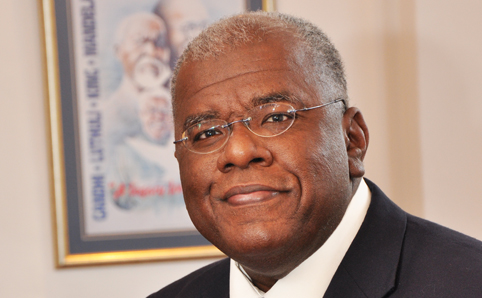Latest News Archive
Please select Category, Year, and then Month to display items
02 January 2025
|
Story Gerda-Marie van Rooyen
|
Photo Supplied
 Leading the research in South Africa is Prof Linus Franke from the Department of Soil, Crop and Climate Sciences.
Leading the research in South Africa is Prof Linus Franke from the Department of Soil, Crop and Climate Sciences.
Scientists are actively pursuing the successful breeding of diploid hybrid potatoes from inbred lines. This is expected to revolutionise potato breeding as it holds the key to rapid genetic progress. It will introduce new varieties for commercialisation through seed. Currently, existing potato variants have a gene that renders self-pollinated seeds infertile.
Prof Linus Franke, an academic in the Department of Soil, Crop and Climate Sciences at the UFS, is leading the research in South Africa. “This technology allows the production of genetically uniform potato seed that is easy to transport and largely disease-free.” He says this differs from conventional breeding whereby only vegetative propagation is possible due to tetraploid varieties in potatoes. It also risks carrying pests and diseases from one generation to the next – leading to the accumulation of pests and diseases with each round of multiplication.
Seed innovation
Prof Franke explains that Solynta BV, a seed company based in the Netherlands that produces potato varieties that can be grown from seed, has included South Africa in their research efforts because it is one of Africa’s largest producers and exporters. Through his academic relationship with Wageningen University and Research, a Dutch institution renowned for its agricultural endeavours and food production, the UFS became involved in researching hybrid potatoes grown from seed.
Diploid seeds containing two sets of chromosomes allow easier gene manipulation to increase predictability and speedier genetic progress. The breeding approach enables the incorporation of tolerance to pests, diseases, abiotic stresses (cold, heat, drought) and other desired genetic traits.
Although Prof Franke is optimistic about this research, he is not blind to disadvantages. “Potato seeds are tiny and have little energy reserves, making it harder to grow potatoes from seed than from tubers.” He says potatoes from seed will take longer to cultivate than tubers, as farmers need to grow plantlets from seeds first, adding six weeks to the growing period. “It is possible that commercial farmers can grow potatoes directly from seed. Alternatively, perhaps more likely, specialised growers will produce tubers of potatoes from seed; these tubers are then sold as seed tubers to other potato farmers, who then continue their normal practices of producing potatoes for the market from tubers.”
Financial benefits
Prof Franke says farmers have reason to get excited. “Seed potatoes will reduce input costs, as varieties with enhanced tolerance to pests and diseases require less pesticides. Planting one hectare of potatoes requires three to four tonnes of potato tubers, but only one 25 g packet of potato seeds.” Since potatoes are a more valuable commodity than maize, this technology might also increase farmers’ income potential.
Prof. Jonathan Jansen to receive lifetime achievement award
2012-03-23
 |
|
Prof. Jonathan Jansen
23 March 2012
|
The University of the Free State (UFS) is proud to announce the nomination of its Vice-Chancellor, Prof. Jonathan Jansen, for a Lifetime Achievement Award for Africa. The nomination by Education Africa is for his work, vision and achievements in higher education.
The past awardees are Archbishop Emeritus Desmond Tutu, Sir Bob Geldof, Sir Richard Branson and David Dinkins, former mayor of New York City.
Education Africa is a non-profit organisation which assists disadvantaged South Africans to obtain a quality, relevant education. Prof. Jansen will receive the award during a Gala Awards dinner in New York, USA, in October this year.
Following on his successful book "We need to talk", Prof. Jansen also recently released a new book entitled "Letters to my children: Tweets to make you think".
The royalties of "We need to talk", to the value of R100 000 will be handed over to the No Student Hungry Campaign of the UFS during a Dinner Launch of the campaign in Bloemfontein tonight.
Prof. Jansen also recently received the Paul Harris Award from the Rotary Foundation of Rotary International for “tangible and significant assistance for the furtherance of better understanding and friendly relations among peoples of the world.”
Media Release
23 March 2012
Issued by: Lacea Loader
Director: Strategic Communication
Tel: +27(0)51 401 2584
Cell: +27(0)83 645 2454
E-mail: news@ufs.ac.za